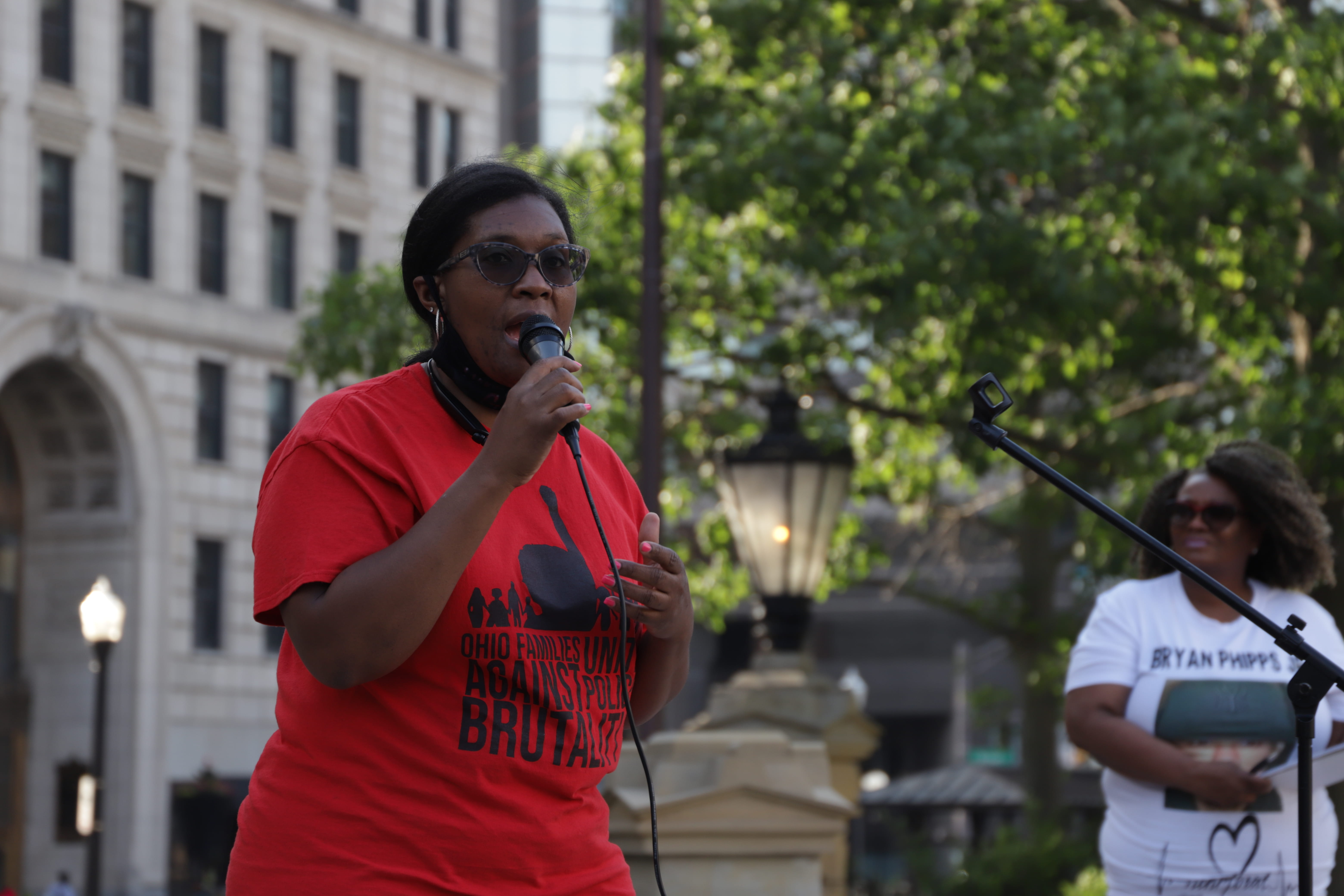
Broken records, each with the name of a Black person killed by Columbus Police, are laid on the steps of the William McKinley statute at the Ohio Statehouse. Credit: Sarah Szilagy | Patricia B. Miller Special Projects Reporter
Mohamed Barry, Jason D. White, Kareem Jones: On the steps of the William McKinley statue facing the Ohio Statehouse Tuesday evening lay dozens of broken records, each with the name of a Black person killed by Columbus Police.
More than 40 people gathered at the Ohio Statehouse on the one-year anniversary of the murder of George Floyd to honor his life and the lives of others killed by police.
Floyd, a Black man from Minneapolis, died May 25, 2020, after former Minneapolis police officer Derek Chauvin kneeled on his neck for more than nine minutes during an arrest. A video of the incident showed Floyd pleading with Chauvin saying, “I can’t breathe,” numerous times. He later died at the hospital.
Chauvin was found guilty of murder for the death of Floyd April 20. He was charged and convicted of second-and third-degree murder and second-degree manslaughter.
“Black men and women, boys and girls — we is in a national state of depression, of stress. Our ancestors paved ways for us to have equal rights, for us to have justice — not injustice,” Jamita Malone, mother of Julius Tate Jr., a Black teenager killed by Columbus Police in 2018, said.
Tate was shot five times and killed by Columbus Police during an undercover sting operation regarding an online selling site to commit robberies, according to the Columbus Dispatch. Tate was reported to have pointed a gun at an undercover officer and robbed him.
Speakers — including the relatives of Deaunte Bell, Henry Green and others who were killed by police — acknowledged the families who have mourned over the past years, sought accountability for police killings and pushed for a petition to end qualified immunity — a legal principle that protects government officials from civil lawsuits for most rights violations.
Cynthia Brown, founder of OH Heartbeat Movement — a group pushing for greater police reform and transparency –– said the families are pushing for an amendment to the Ohio Constitution that would allow individuals to sue state and local government entities and officials for all civil rights violations. The group seeks 1,000 petition signatures by June 2.
“We must end qualified immunity. All too often, it shields law enforcement officers from responsibility,” Brown said.
Morgan Harper, a 2020 Democratic-primary candidate for Ohio’s 3rd congressional district, told the crowd that recent advocacy against police violence has not meant the discovery of a new problem, but rather more people paying attention to a widespread issue.
“What we’re also seeing is the limitations of the progress that we’ve made so far,” Harper said. “Limitations in terms of actual policy changes and accountability that are going to happen to make sure that when these incidents occur, families get justice.”
Bell, a 25-year-old Black man, was shot and killed by Columbus Police officers Matthew Baase and John Narewski in 2015. He was approached by officers while in a car in the parking lot of an apartment complex. Police said there was suspicious activity when they stopped the car and shot him just outside of the car because he was reaching for a gun, according to the Columbus Dispatch.
Green, a 23-year-old Black man, was shot and killed by undercover Columbus Police officers Jason Bare and Zachary Rosen in 2016. According to court documents, Green shot at officers, who returned shots, killing him after he ignored commands to drop his gun.

Adrienne Hood speaks at a vigil held outside the Ohio Statehouse in honor of George Floyd and others killed by police Tuesday. Credit: Sarah Szilagy | Patricia B. Miller Special Projects Reporter
Adrienne Hood, mother of Green, said Ohio and federal legislatures are failing to keep their promises of making reform, and she wants to focus on what the public can do to end qualified immunity in Ohio.
“It’s going to take all of us,” Hood said. “It’s going to take organizations coming together, people who would not normally or typically come together to make this happen.”
Hood said she and others continue protesting in order to protect the next generation from what her son and others faced.
“We can easily go away, but we’re not. And all we’re asking for is for the communities to come together collectively and make the changes that are necessary,” Hood said.


